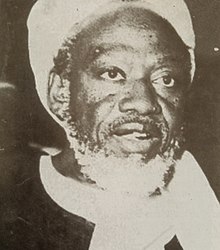Abubakar Gumi
Grand Khadi Abubakar Gumi | ||
|---|---|---|
Movement Izala | | |
| Main interest(s) | Tafsir al Quran and so many other books | |
| Notable idea(s) | Tafsir and Fiqh | |
| Notable work(s) | Raddul azhan ila ma'anil kur'an | |
| Occupation | Scholar, Teacher and judge | |
| Muslim leader | ||
Influenced by
| ||
| Children | Ahmad Abubakar Gumi, Hamza Gumi, Mustapha Gumi, Abdulkadir Gumi, Abbas Gumi, Sadiya Gumi, Badiya Gumi | |
Abubakar Mahmud Gumi (7 November 1924 – 11 September 1992)
Gumi emerged as a vocal leader during the
He has a large number of children, however his most popular child happens to be Dr
.
Gumi is a follower of the
and other books like (hullu nizam ala nuzuul isa).[4]
Biography
Early life and education
Gumi was born in the village of Gummi now a local government area in
After completing his studies at the middle school, he went to Kano to study Law and was trained as a Qadi. He started work as a scribe to Qadi Attahiru but he soon became disenchanted with the specifics of his job. He gave private lessons on Islam and tafsir as an escape from his disenchantment. He lost his father in 1937 while he was at the middle school. He got married 3 years later to Maryam in 1941 when he was just 19.[2]
Early career
In 1947, Abubakar Gumi left his job as secretary to Qadi Attahiru and went to teach at the Kano Law School, which he had previously attended. While in Kano, he met Sheik Sa'id Hayatu, a man widely considered one of the most prominent victims of colonial rule. Hayatu was the leader of the Mahdiyya movement and had just returned from a forced sojourn in Cameroon. Abubakar became enthralled with the teachings of the Mahdiyya movement and briefly became a follower; he later married Hayatu's daughter, Maryam. However, she died after giving birth to a son. Abubakar Gumi's first son wasn't Ahmad Abubakar, but Dr Hamza Abubakar, a medical doctor currently practicing in Riyadh, Saudi Arabia, followed by Maj. Gen. Abdulkadir Abubakar (rtd.) and two elder sisters--one married to late Justice Muhammadu Bello, former chief justice of the federation, and the other married to Sheik Sunusi Gumbi, a well-known Islamic scholar and student of Abubakar Gumi.
In 1949, Gumi took a teaching job at a school in Maru, Sokoto. The school had a famous tutor,
He left Maru to further his education at the school of Arabic Studies in Kano. On completion of his studies, he became a teacher for two years at the school. He also attended a school of education in Sudan.[6]
In 1957, he became an interpreter for the Northern Nigeria government on Saudi Arabia matters.
Conflicts
Abubakar Gumi had reservations about the administrative and religious guidance of the
Another target of Gumi was the
Mass media approach
Sheik Gumi made his first pilgrimage to
Rise of Izala and Islamic Fundamentalism

By the late 1960s, after the death of Bello, Gumi's major Nigerian political support and moderating influence was gone. He felt the new administration had the political power to curtail his views, and in the process, he resorted to consulting his friends in
Many within the political cycles and Sufi Brotherhoods of
Gumi believed that Nigerian Muslims should never accept a non-Muslim ruler, but he also advocated peaceful coexistence with non-Muslim groups.[2]
Awards and honors
He received the
Abubakar Gumi who was referred to as the father of Izala as he usually mentioned during his Islamic teaching process, succeeded in overwhelming the establishment of the 1970s organisation by name Izalatul Bidi'ah wa Iqamatussunah co-founded by one of his prominent student whom Gumi tutor in his previous job as a school teacher at School of Arabic Studies (SAS) in Kano, though he also maintain his membership in Jama'atu Nasrul Islam (JNI) which favour him to proceed in his Islamic teachings at Kaduna central mosque handed by the above-mentioned organisation, JNI.
See also
References
- ISBN 90-04-10494-1.
- ^ a b c d "Obituary: Sheikh Abubakar Mahmud Gumi". The Independent. 1992-09-15. Retrieved 2022-09-29.
- ISBN 0-8157-6817-6
- ISBN 978-90-04-10494-5.
- ^ Lomeier p 48-50.
- ISBN 0-8101-1037-7
- ISBN 0-8101-1346-5
- ^ a b Paden p 61.
- ^ Lomeier p 209
- ^ Lomeier p 210.
